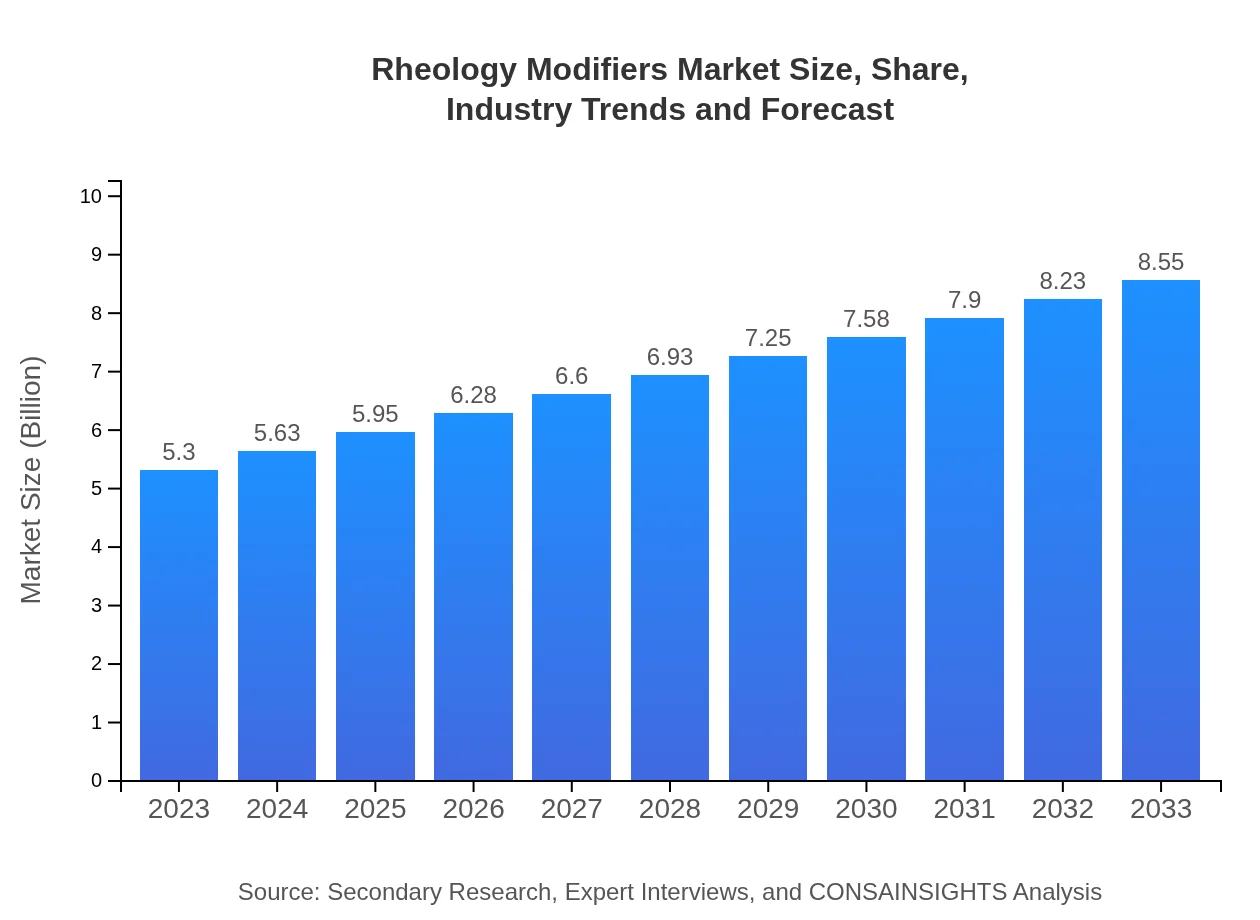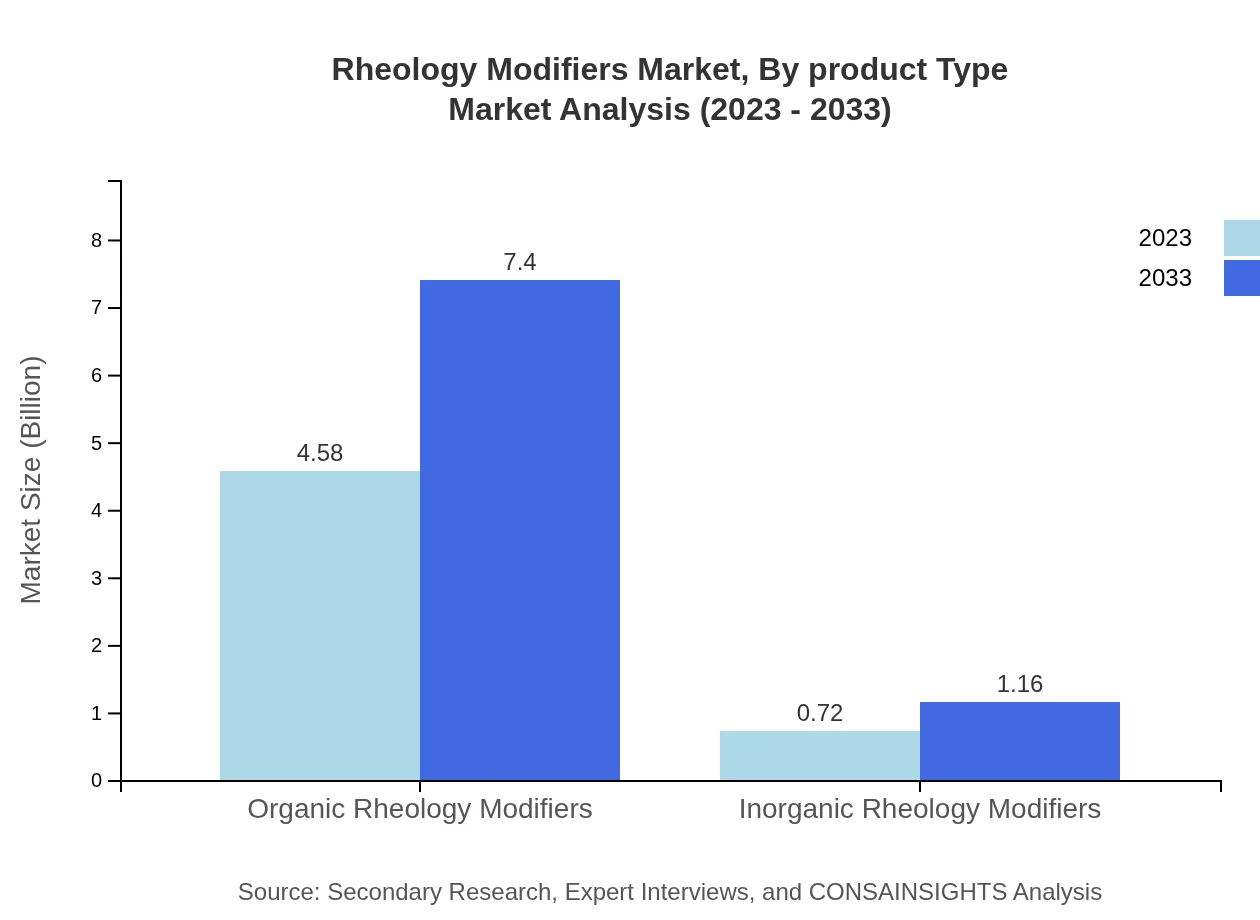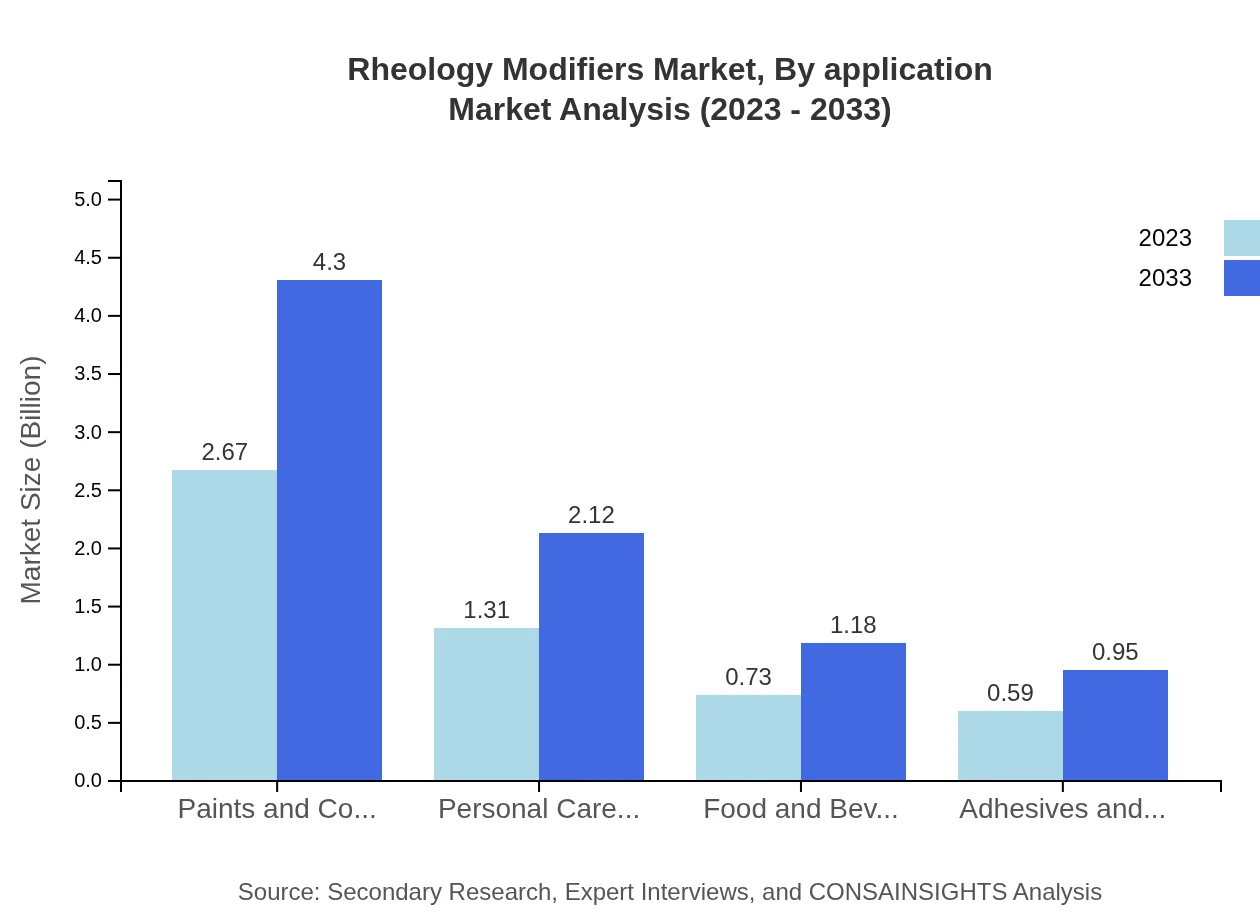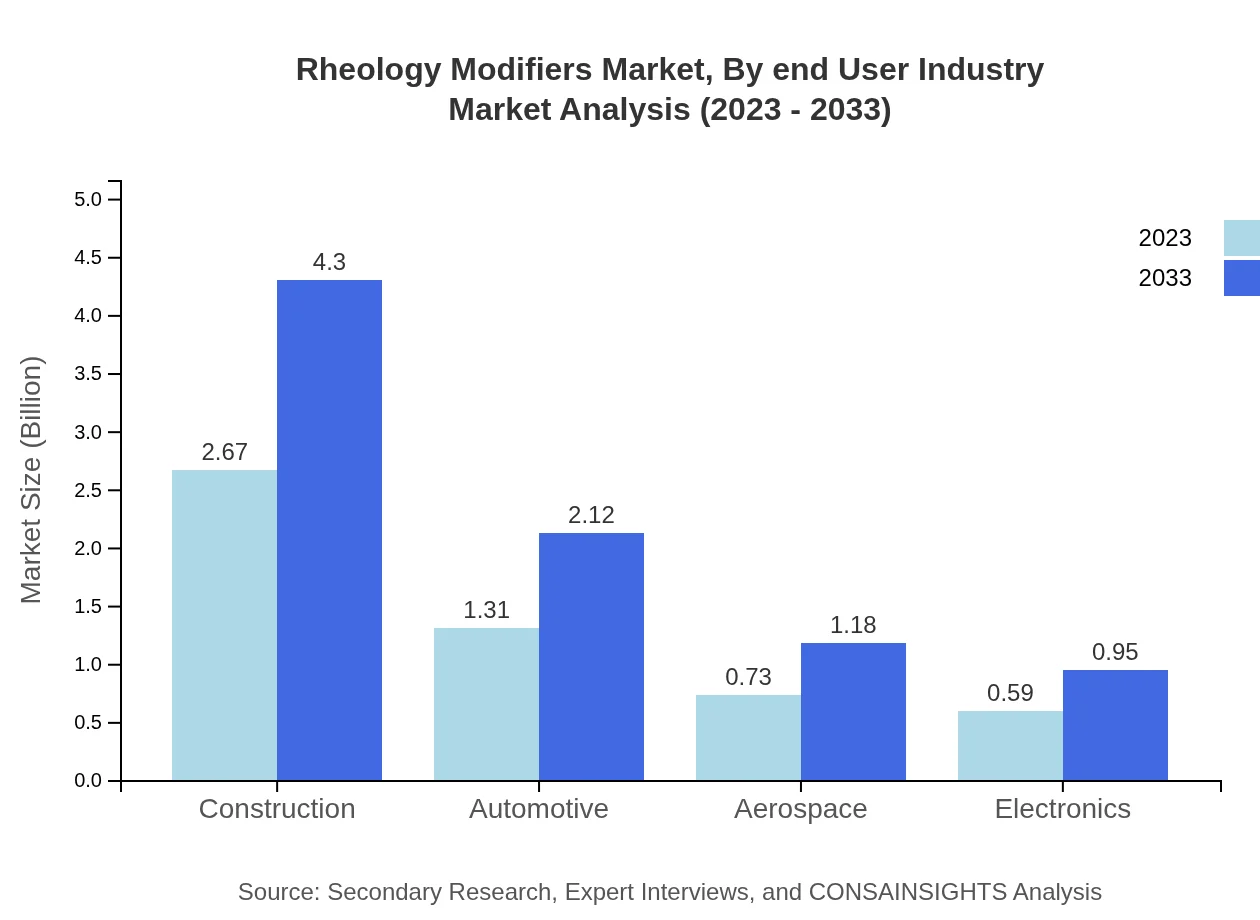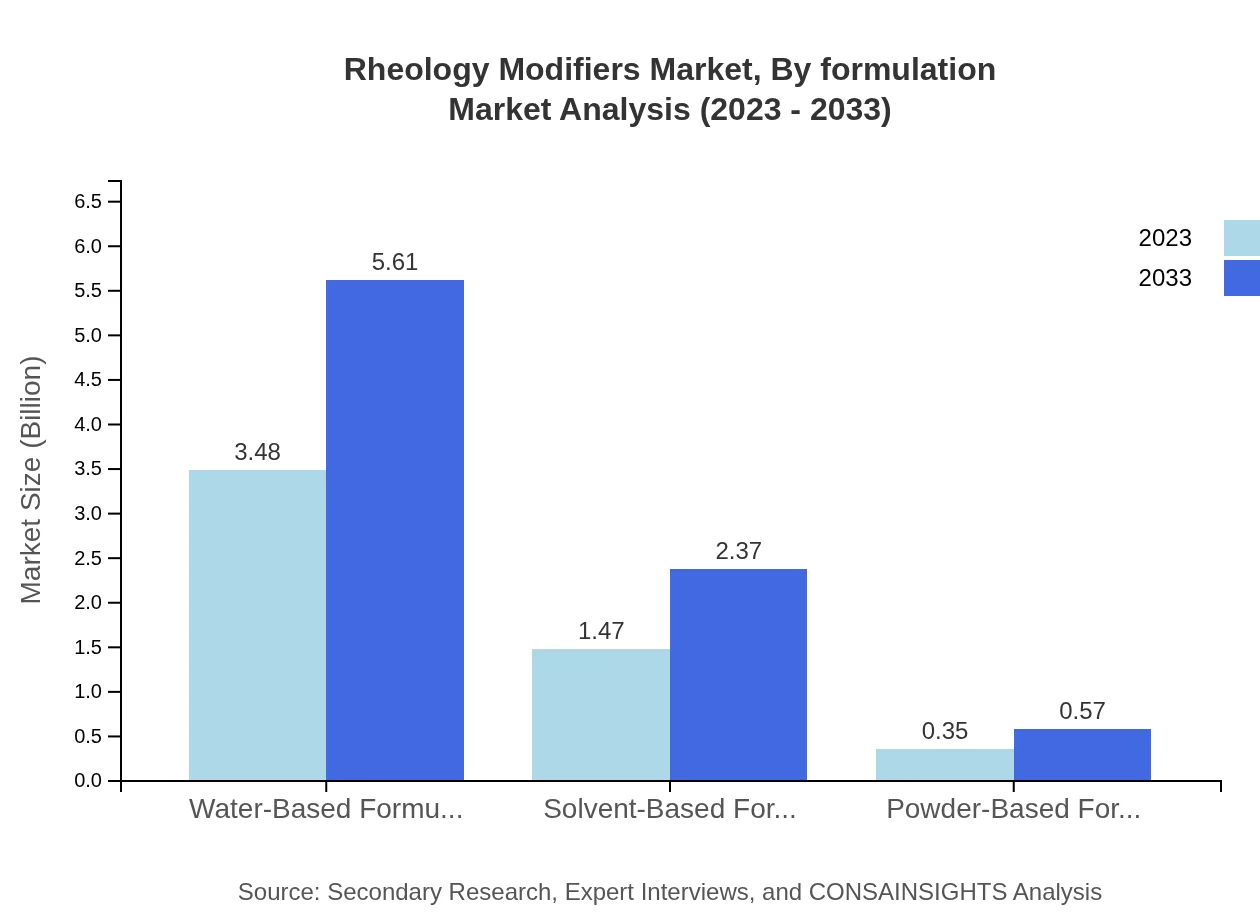Rheology Modifiers Market Report
Published Date: 02 February 2026 | Report Code: rheology-modifiers
Rheology Modifiers Market Size, Share, Industry Trends and Forecast to 2033
This report provides a comprehensive analysis of the Rheology Modifiers market, covering crucial insights from 2023 to 2033. It includes market size, growth trends, regional analyses, and sector segmentation to guide stakeholders in informed decision-making.
| Metric | Value |
|---|---|
| Study Period | 2023 - 2033 |
| 2023 Market Size | $5.30 Billion |
| CAGR (2023-2033) | 4.8% |
| 2033 Market Size | $8.55 Billion |
| Top Companies | BASF SE, Dow Chemical Company, Ashland Global Holdings Inc., Evonik Industries AG, Kraton Corporation |
| Last Modified Date | 02 February 2026 |
Rheology Modifiers Market Overview
Customize Rheology Modifiers Market Report market research report
- ✔ Get in-depth analysis of Rheology Modifiers market size, growth, and forecasts.
- ✔ Understand Rheology Modifiers's regional dynamics and industry-specific trends.
- ✔ Identify potential applications, end-user demand, and growth segments in Rheology Modifiers
What is the Market Size & CAGR of Rheology Modifiers market in 2023 and 2033?
Rheology Modifiers Industry Analysis
Rheology Modifiers Market Segmentation and Scope
Tell us your focus area and get a customized research report.
Rheology Modifiers Market Analysis Report by Region
Europe Rheology Modifiers Market Report:
The European market for Rheology Modifiers is expected to grow from $1.59 billion in 2023 to $2.57 billion by 2033. Strict regulatory measures regarding environmental impacts and a shift towards more sustainable and eco-friendly products significantly influence this region's demand dynamics.Asia Pacific Rheology Modifiers Market Report:
In 2023, the Rheology Modifiers market in the Asia Pacific region is estimated to be valued at $1.00 billion, expected to grow to $1.61 billion by 2033. Rapid industrialization and increasing disposable incomes are driving demand in sectors like paints, coatings, personal care, and food and beverages, setting the stage for continued market expansion.North America Rheology Modifiers Market Report:
North America holds a significant market share, with a projected size of $1.93 billion in 2023, growing to $3.12 billion by 2033. The presence of major manufacturers and continuous innovations in product offerings are vital contributors. Moreover, the push for sustainable products in industries like automotive and construction is driving growth.South America Rheology Modifiers Market Report:
The South American Rheology Modifiers market, valued at $0.45 billion in 2023, is projected to reach $0.72 billion by 2033. Key growth drivers include rising construction activities and the increasing use of rheology modifiers in the personal care and cosmetics sectors. Economic recovery post-pandemic further bolsters market demand.Middle East & Africa Rheology Modifiers Market Report:
The Rheology Modifiers market in the Middle East and Africa is valued at $0.33 billion in 2023, projected to increase to $0.54 billion by 2033. Growth in the construction industry, alongside rising demand for personal care products, is driving this regional market forward.Tell us your focus area and get a customized research report.
Rheology Modifiers Market Analysis By Product Type
In 2023, organic rheology modifiers dominate the market, with a size of $4.58 billion, which is projected to grow to $7.40 billion by 2033. This segment represents 86.49% of the total market share. Inorganic modifiers, while smaller in market size, account for significant demand in specific applications, growing from $0.72 billion in 2023 to $1.16 billion by 2033, holding 13.51% share.
Rheology Modifiers Market Analysis By Application
The Paints and Coatings sector is key, estimated at $2.67 billion in 2023 and projected to grow to $4.30 billion by 2033, accounting for 50.3% of the market share. The Personal Care Products classification follows, anticipated to escalate from $1.31 billion to $2.12 billion. The Food and Beverage industry also shows promise, reflecting a growth trajectory from $0.73 billion to $1.18 billion, while Adhesives and Sealants are expected to grow from $0.59 billion to $0.95 billion.
Rheology Modifiers Market Analysis By End User Industry
In 2023, the Construction industry leads with a market size of $2.67 billion, with forecasts suggesting it will rise to $4.30 billion by 2033. Following closely, the Automotive sector stands at $1.31 billion, expected to reach $2.12 billion. Other sectors like Aerospace and Electronics also present growth opportunities as demand for specialized rheology modifiers increases.
Rheology Modifiers Market Analysis By Formulation
Water-based formulations encompass the largest share, valued at $3.48 billion in 2023, projected to reach $5.61 billion by 2033, holding 65.64% of the total market share. Solvent-based formulations and powder-based formulations are also relevant, growing respectively from $1.47 billion to $2.37 billion and $0.35 billion to $0.57 billion.
Rheology Modifiers Market Trends and Future Forecast
Tell us your focus area and get a customized research report.
Global Market Leaders and Top Companies in Rheology Modifiers Industry
BASF SE:
BASF is one of the largest chemical producers in the world, offering innovative solutions in rheology modifiers. Their extensive product range supports various industries, emphasizing sustainability.Dow Chemical Company:
Dow is renowned for its high-performance materials and specialty chemicals, including cutting-edge rheology modifiers that enhance product functionality across different applications.Ashland Global Holdings Inc.:
Ashland provides a variety of specialty additives, including rheology modifiers designed for paints, coatings, and personal care products, focusing on performance and customer satisfaction.Evonik Industries AG:
Evonik is a leader in nutritional and specialty chemicals, offering innovative rheology modifiers that provide significant flow control in diverse applications.Kraton Corporation:
Kraton specializes in sustainable modified biopolymers, creating rheology modifiers known for their eco-friendliness and performance in varied formulations.We're grateful to work with incredible clients.









FAQs
What is the market size of rheology Modifiers?
The global rheology modifiers market is valued at $5.3 billion in 2023, with a projected CAGR of 4.8% until 2033. This growth indicates increasing applications across various industries.
What are the key market players or companies in the rheology Modifiers industry?
Key players in the rheology modifiers market include manufacturers and suppliers who provide innovative solutions in various segments. Industry leaders consistently seek advancements to cater to diverse application needs.
What are the primary factors driving the growth in the rheology Modifiers industry?
Growth in the rheology modifiers market is driven by rising demand in construction, automotive, and personal care sectors, alongside growing innovation in formulations that enhance product performance and sustainability.
Which region is the fastest Growing in the rheology Modifiers?
North America is identified as the fastest-growing region, projected to increase from $1.93 billion in 2023 to $3.12 billion in 2033, reflecting robust demand in various industrial applications.
Does ConsaInsights provide customized market report data for the rheology Modifiers industry?
Yes, ConsaInsights offers customized market report data tailored to specific client needs in the rheology modifiers industry, providing in-depth insights and data analysis for strategic decision-making.
What deliverables can I expect from this rheology Modifiers market research project?
Expect comprehensive market analysis, including data on market size, growth forecasts, segmentation analysis, competitive landscape, and trends that affect the rheology modifiers sector.
What are the market trends of rheology Modifiers?
Key trends include increasing adoption of water-based formulations, sustainability initiatives, and advancements in rheology modifier technologies that enhance product performance across various applications.

